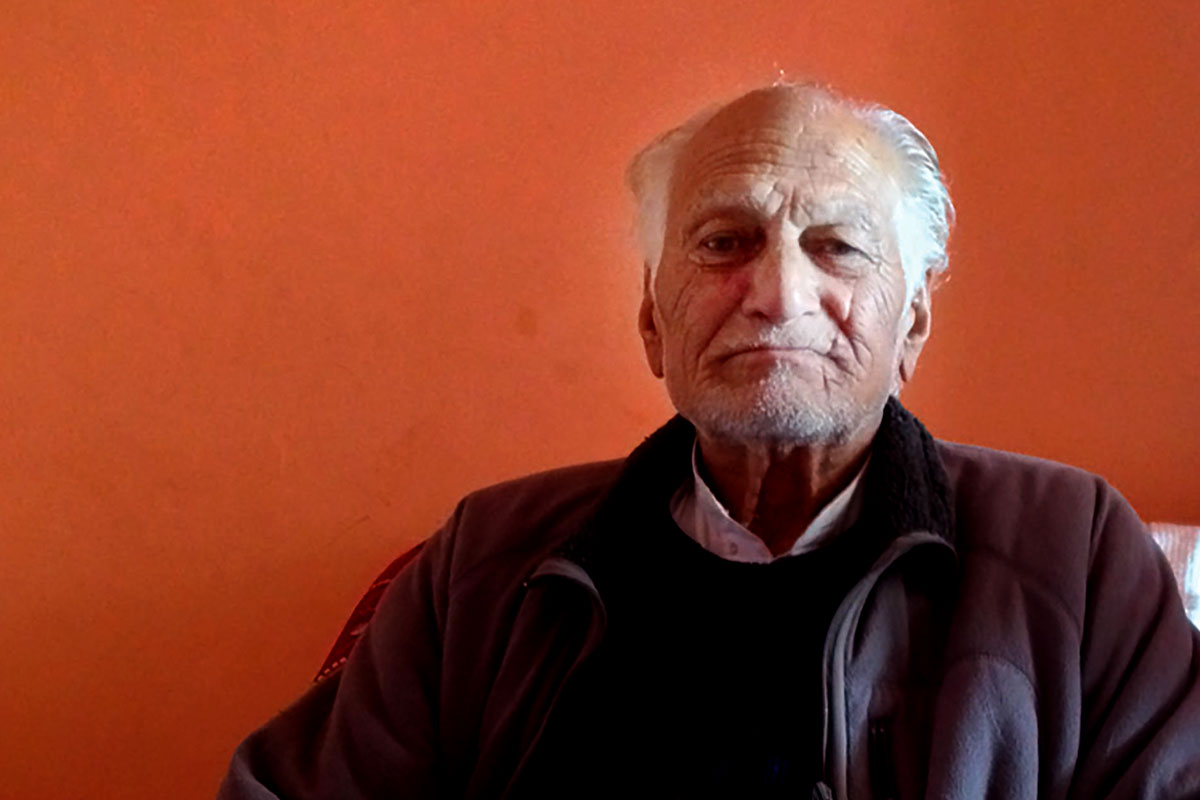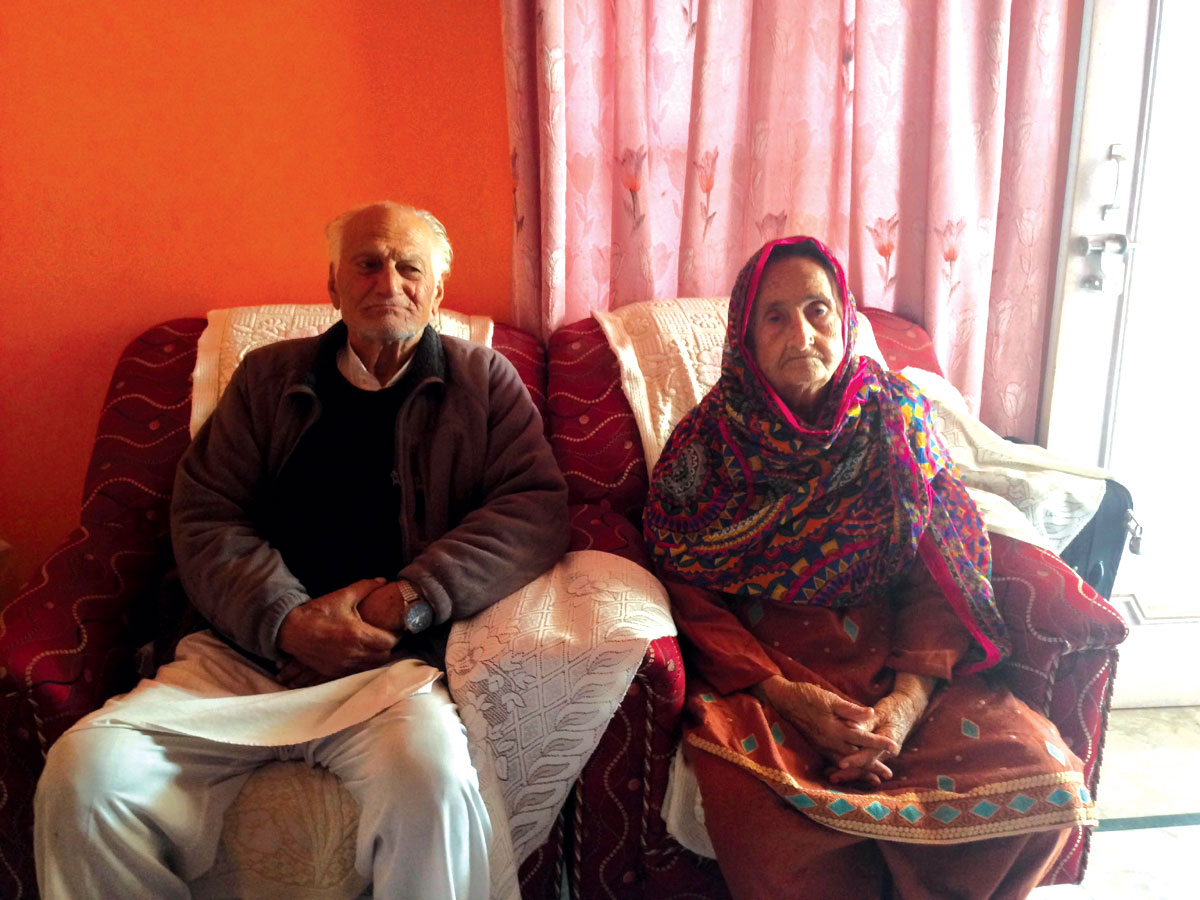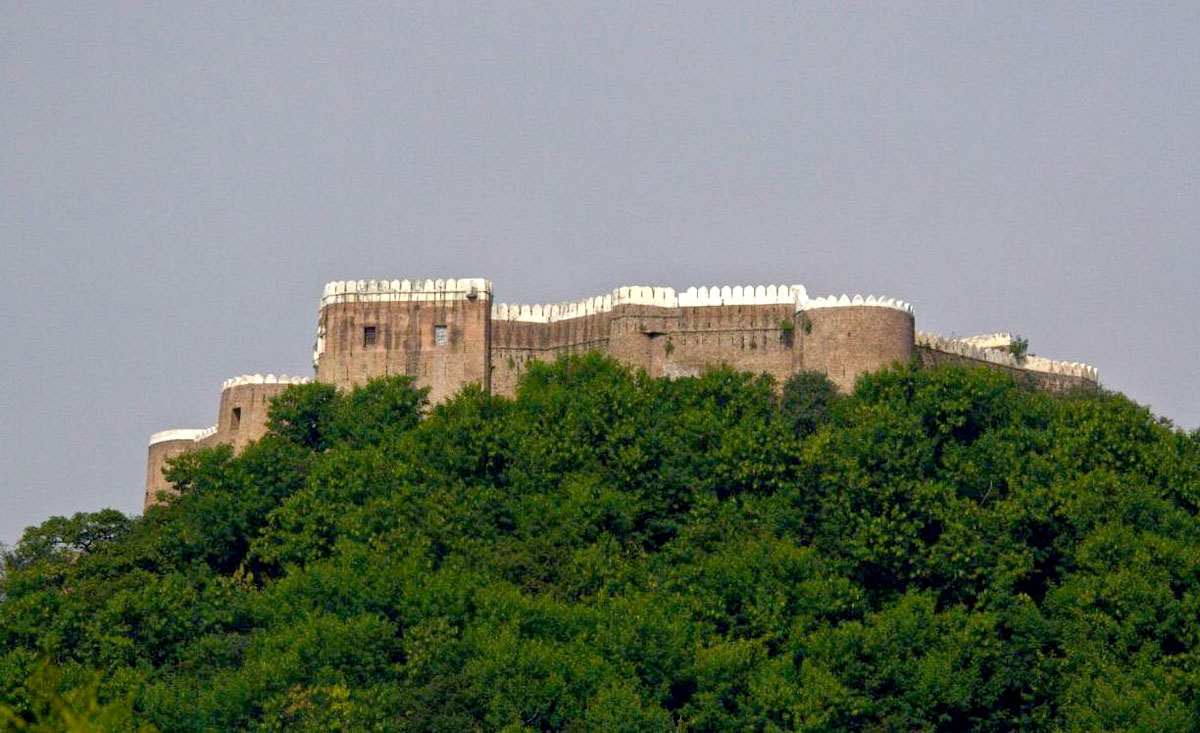Barely married he was and the partition took place. After surviving the massacres at his Reasi home, Karimuddin and his family fled deep into the jungles where they had to manage their survival as the tribals ruled the roost. Finally, they escaped to Jhelum through Rajouri and Mirpur and returned home in Bakhshi era, retrieved his father’s skeleton and raised the family again. Masood Hussain meets the nonagenarian couple to tell their first-hand story

My name is Haji Karimuddin. I live in Reasi. I was a contractor. Now, my kids are employed, so I don’t do anything. I have never gone to school. I speak well and make signatures, but I am totally illiterate.
I do not remember exactly when I was born. But I would have been 20 or 25 in 1947 when the commotion started. Barely seven months before the commotion, I had married to Sakina Bibi, also a resident of Reasi.
The rulers, then, were treating us as well as our leaders very badly. Before 1947, it was calm. But once India and Pakistan were established, massacres took place.
Here, in Reasi, almost eight thousand Muslims were killed. Some people came from outside the state and were joined by a few residents and they resorted to bloodshed. The ex-servicemen of Hari Singh’s army were given rifles and they also killed people.
I do not remember if it was October or November, but I am sure it was after Eid-ul-Adha. The rioters had come from Jammu and the areas around Punjab. Around eight thousand people had gathered in Reasi. When they saw that people have gathered, they called Maharaja’s army here. They mounted big guns near the Dera and started firing. We were in a big house – women, men and children. We had shut all curtains, latched the doors with big logs of wood and blocked the gates with stones. The walls of that house were so strong that even canons would not break it.
When they fired, people who were outside were killed. Then the house was cordoned off, and those who were inside were offered a peace offer. They were told to come out and promised they won’t be harmed. There were a lot of females and they were taken out – men were killed and young women were looted by intruders. After killing, their bodies were dropped in a Khu. Some kind residents did save many people, mostly children. Young women were looted by the intruders from outside states who were armed with swords and guns. The old women took a road to Jammu, but most of them jumped into the river and committed suicide. Some of them, who survived, were taken to camps in Jammu and later sent to Pakistan.

Those days, the governments of India and Pakistan accepted such stranded people. Hindus came here and Muslims went there to Pakistan. A lot of bloodsheds happened there too. Pandits, Hindus living in Sialkote and Lahore were also slaughtered. That period was volatile.
We lived in Bhida village. We had come to the town three days before. I was accompanied by my two brothers and sisters-in-law. My father stayed back and asked us to go to Reasi. He said he was an old man and would not be killed.
A boy went to a mill to get his grains grinded. While he was returning, a Sadhu applied Sindoor to him and gave him a blow with his sword. Injured, he ran away and told the Muslims about the incident. So Muslims assembled to avenge the attack.
The other Mohalla is a Hindu majority locality. So when the Muslims went for the revenge, two Muslims, Kalla Shah and Sandhu Shah, came in front of the mob and shouted – ‘kill us first and then the Hindus’. So the mob returned. They subsided the situation, but when the military came, they were the first to be killed. There is a ground near the Deputy Commissioner’s office called Sheren Wala Bagh, where they were killed.
We left before the mayhem. I told my brother that the chances of survival were bleak as most of the people had been killed so we must leave. Then, a bridge existed here at Sawal. The government had deployed retired army officers to manage it. Among them was a Subedar from our area. His name was Kripa Ram. All people weren’t cruel, some were good-hearted too. Kripa Ram sent a message to my father inviting him to cross to the other side along with his kids. So we left with all our baggage in the night, and during wee hours, we reached that bridge where that Subedar was deputed. He made us cross the river which otherwise was not permissible.
We made an uphill trek where we saw the army from Azad Kashmir carrying out attacks. They too comprised of retired soldiers. They were carrying out ambushes. We were perplexed about what was happening. Heavy fire was exchanged and people on both sides of Sawal were killed. Those who survived gathered at a site behind the bridge but they were tracked down and killed. They were some two thousand people; most of them were Bakerwal shepherds. Their possessions, including herds and money, were looted by the attackers. I am not saying that we only were affected, the fact is that people on both sides were affected.
Then we took shelter in the mountains. We lived there for three months till it snowed. Then we proceeded towards Srinagar.
We are basically residents of Kashmir. My grandfather hails from Danew Kandimarg (Damhal Hanjipora in Kulgam). We had our lands there. That region was relatively peaceful. Sheikh Sahab didn’t let those mishaps happen there in Kashmir. So we had decided to go there, but could not, because a heavy snowfall closed the tracks. So we went to Rajouri, and from there to Mirpur and finally to Pakistan. We were about 150 people along with our kids and daughters. While we were on our way we also faced Ikhwanis who pointed their guns at us. We got frightened. To be brutally honest, we made our mind to kill our girls ourselves in order to protect their chastity. They were animals devoid of humanity who plundered as well as lynched people. They butchered people irrespective of what religion they belonged to. They just slaughtered. Their General, however, saved us. He knew his men were unruly so he protected us. We didn’t even stopped at night and reached Pakistan.
We stayed in Pakistan for five years. My children were born there. I was married but issueless when the mayhem took place. However, we didn’t feel at home there. I told my brother about a return. By then, Sheikh Sahab and Beigh Sahab had restored peace in Jammu. The border was not that rigid. People easily moved across and they said the atmosphere was peaceful, riots had stopped.

We lived at Jhelum in a Gurudwara that lacked its worshippers. We lived there and were provided with two kilos of the ration. At that time, it was Bakshi’s rule. Bakshi had declared that whoever would come should not be bothered and should be given their rightful place. My brother settled in the village and I settled in Reasi.
Some of the families, however, did not return. My nephews live in Jhelum.
Our family survived scattered and bruised. All those relatives who could not leave Reasi were killed. These included my father. Later, we came to know that he was actually killed in his own home. After we came to know about the spot from where his body was dropped down, we decided to attempt tracing the remains. We succeeded in unearthing his bones. We put them in a sack and offered his funeral prayers and then buried it seven years after his murder. He was seventy years old when he asked us to leave the area. His name was Misrti Azizuddin.
Mohammad Din, Maghrab Jan and Fakir Sayi were my brothers. They are no more but their kids are alive.
The canons that were mounted in the area were used to kill us. They used the canons on the big house in which we had taken refuge. A Kashmiri who lived here was killed here. He had married a Hindu girl and settled here and that was the reason why he was killed. Another Kashmir, who was known as Malik Sahab was also killed.
Not everybody who left Reasi returned later. Most of the people who had gone to Pakistan did not return. But most of the people who had fled to Kashmir or taken refuge in the Chenab valley did return. Chenab valley was saved in 1947.
We did not know much about the women who were looted except one. She belonged to the family of a woodcutter and lived here. She was living in a Rajput family in Akhnoor and had begotten children too. So when her brother traced and came, he did not disturb her rather let her live in that family. This was despite the fact that the government had set up a rehabilitation system. Her children are still alive and live as Rajput Sikhs in Akhnoor. I think her brother made the right decision. It was her fate. Her children knew about their mother’s roots. They knew and met their maternal uncle.
Those days, life was not good anywhere. We saw the situations on the other side and came back. By the grace of Almighty, we are happy; we live happily with our Hindu brethren and have put a curtain on the past.
In Jhelum, I lost my brothers and my uncle. My two sons who were born there died there. We were blessed with five sons and three daughters. The eldest of the sons retired and is living in Jammu. My one daughter lives in Mumbai and another in Bengal. One of my sons works for Srinagar Municipality and lives in Srinagar. Another of my sons works for the police.
(Irtiza Rafiq processed this interview)
















And what will happen if few southern districts of Kashmir get si called Azadi or Join Pakistan. Forget Kashmi, 200 Million Muslims living in India will not be distributing sweets but joing you in Azadi. Have Muslims in Myanmar got Azadi? By the time Kashmir gets Azadi, India would by then created 3 Muslims countries for Muslims living in India. Even world will laugh at India or on Hindus if 200 Muslims in India keep living in India. Do not be delusional…read this story and watchhundreds of YouTube videos of Pakistanis who had to migrate to Pakistan in 1947. This time, there is no Gandhi, Nehru, British Army, Nawabs with Muslim police or Armies or Razakars